First Healthcare Compliance Survey: Current state of healthcare compliance management
Date Posted: Monday,
November 02, 2015
During the latter two weeks of September 2015, an online survey was conducted
by Marketing Matters on behalf of First Healthcare Compliance to learn more
about the current state of healthcare compliance management from those involved
in compliance.
View
report as a PDF Click here
View 1st Heathcare Compliance
website
This executive summary reports the results and findings from the survey.
Seventy-nine respondents from 22 US states provided input to the survey:
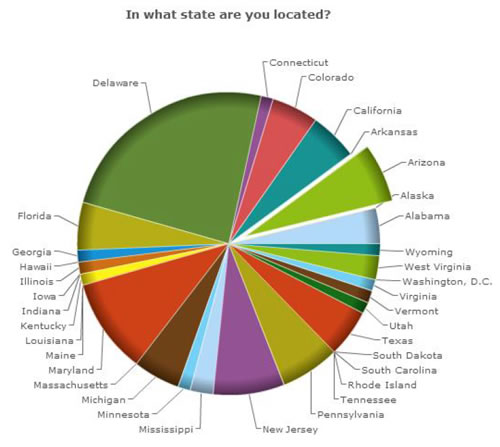
Responses were provided by a range of healthcare organizations and businesses including healthcare providers in private practices and those associated with a hospital network or health system. Other respondents represent the primary hospitals or health systems themselves, Healthcare Billing Companies, Skilled Nursing Facilities and those who provide Long Term Care or Assisted Living. The majority of the respondents are involved in private healthcare practices including dental, ophthalmology, otolaryngology (ENT), physical therapy, home healthcare and more.
The respondents' roles in their organizations are Administrators, Owners, CEOs/
Presidents. The remainder indicated a primary role in Compliance and/or Risk
Management, Practice/Office Management, or in Billing.
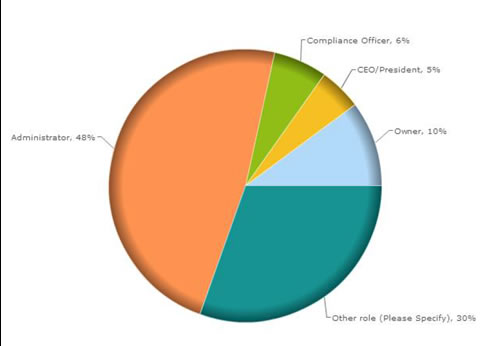
The tenure of the respondents range from one year to well over 35 years, with 25% indicating a tenure between 5-10 years, and 32% in their role for 11 or more years (more than half of this group had tenure greater than 25 years).
We asked participants to indicate the average amount of time they spent weekly on managing the multiple aspects of compliance including OSHA, HIPAA, Fraud, Waste & Abuse, Billing/Coding, Policies & Procedures, Employee Training and other areas that respondents specified including finance, statistics, payroll/taxes, ICD-10 & Meaningful Use, Investigations, and overall Risk Management.
The following chart provides an overview of where respondents are spending
their time weekly to manage compliance. The majority of respondents indicate
that their time spent on compliance in the areas of OSHA, Fraud, Waste & Abuse
represent the fewest hours weekly (1 or less hours), while Billing & Coding
followed by Policies & Procedures are absorbing the most time followed by HIPAA
and Employee Training.
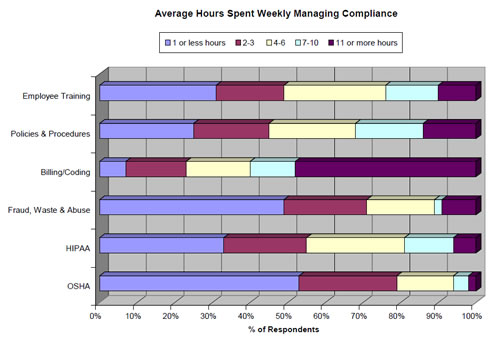
Compliance Resources:
Employees:
Understanding the resources utilized to manage compliance is helpful in learning more about the state of Healthcare Compliance Management. Currently, more than half of those responding to the survey indicate managing compliance through one full-time employee. Approximately 25% of the respondents utilize between 2-4 full-time employees to manage compliance, and the remaining 21% use 5 or more full-time employees to manage compliance with the majority of them using 8 or more full-time employees.
Most respondents (65%) do not use part-time employees at all to manage compliance,
with 13% using one part-time employee and 14% utilizing between 2-4 part-time
employees.
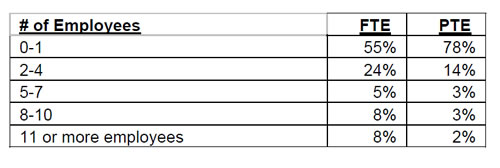
Outside Sources:
Engaging outside sources is an active practice that many respondents utilize
to manage compliance. 61% of the respondents uses outside sources for helping
them manage OSHA, HIPAA and Billing/Coding, and Employee Training.
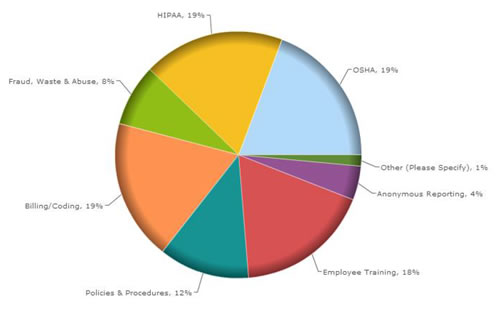
Compliance Challenges:
Keeping abreast of new or changing compliance regulations and finding time
to manage compliance were stated as the top two compliance challenges. Lack
of time remains a top compliance concern of many respondents.
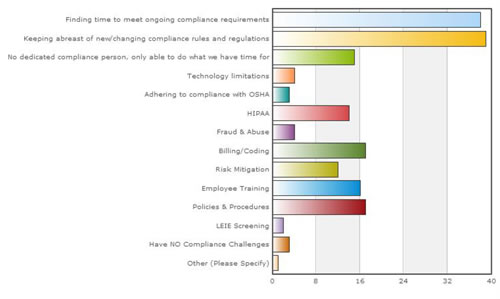
Solutions:
Almost equally divided is how our respondents are planning to solve their compliance
challenges. 35% report being compliant, yet are still seeking greater efficiency.
Another 30% of the responses view solving their compliance challenges as a top
priority and as such, want to have a solution in place within a three month
timeframe.
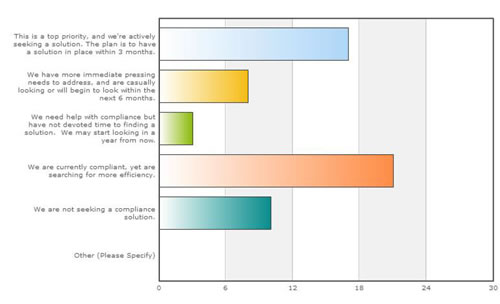
Conclusion:
The percentage of respondents relying on outside sources for help with compliance clearly points to the lack of time, internal resources and expertise they have to solely address the responsibilities associated with managing compliance. The many areas of compliance management are requiring a more efficient, cost-effective and practical approach to mitigate risk and maintain compliance in today's ever-changing landscape. Respondents have indicated it is a timely need that they plan to address for their business/practice in the near term.
First Healthcare Compliance
Founded in 2012 in Wilmington, DE by Julie Sheppard, First Healthcare Compliance
is a privately-owned women business enterprise created to address the void of
healthcare compliance resources available to help physicians and other healthcare
providers in private practice, hospital networks and health systems, healthcare
billing companies and skilled nursing facilities comply with the rules and regulations
of the Affordable Care Act.
http://1sthcc.com/

